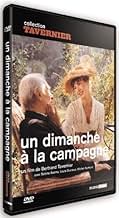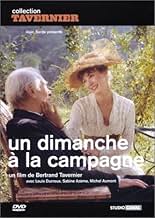CALIFICACIÓN DE IMDb
7.4/10
3.4 k
TU CALIFICACIÓN
Un anciano pintor cuyo hijo visita a su familia los fines de semana, también se ve sorprendido por la visita de su hija, aún soltera.Un anciano pintor cuyo hijo visita a su familia los fines de semana, también se ve sorprendido por la visita de su hija, aún soltera.Un anciano pintor cuyo hijo visita a su familia los fines de semana, también se ve sorprendido por la visita de su hija, aún soltera.
- Dirección
- Guionistas
- Elenco
- Nominada a1 premio BAFTA
- 13 premios ganados y 12 nominaciones en total
Sabine Azéma
- Irène
- (as Sabine Azema)
Geneviève Mnich
- Marie-Thérèse
- (as Genevieve Mnich)
- Dirección
- Guionistas
- Todo el elenco y el equipo
- Producción, taquilla y más en IMDbPro
Opiniones destacadas
I saw this film as a gift. For images, reminding the work of an Auguste Renoir, for portrait of family and the small gestures defining the relations between its members, for lovely acting and for the good state of soul inspired by it.
I discovered it, in same measure, as a beautiful gift offered by Bertrand Tavernier. A precious gift about meaning of life and meanings of visits, about the games of children and problems of adults, about joy and the shadows of sadness, about a venerable manner and the lady helping him in ordinary problems.
Nostalgia ? Off course, but it represents more and , scene by scene, you feel it.
A beautiful film as a precious circle of emotions.
I discovered it, in same measure, as a beautiful gift offered by Bertrand Tavernier. A precious gift about meaning of life and meanings of visits, about the games of children and problems of adults, about joy and the shadows of sadness, about a venerable manner and the lady helping him in ordinary problems.
Nostalgia ? Off course, but it represents more and , scene by scene, you feel it.
A beautiful film as a precious circle of emotions.
Not much happens during "A Sunday in the Country", which depicts what the title suggests: a well-to-do French family having a Sunday gathering during what appears to be the 1920s - it is the world of Marcel Proust, only a few decades later. This presents more of a family portrait and character revelation piece than a plotted story. We get to know the main characters and their relationships - the genteel old father dotes on his exciting daughter and is critical of his dour, proper son. He is dependent on the crabby housekeeper who rules the home. It is a mellow, fine-looking film, sprinkled with comments on impending death and art. Sabine Azema steals the show as the charming but flaky Irene.
A film that tells a story of a family gathering in a Sunday without not interesting happening had all motives to be boring.
Slow scenes, children running and playing, the grandpa happy for receiving his well behaved and always present son and waiting for the surprise of the sister coming. Will she come? Yes, and not interesting happens except for scenes from real life.
The grandpa puts his granddaughter on the shoulders and gets tired. He complains with the maid for the shoes that were obviously where they were meant to be.
The daughter is independent and unhappy, but can not admit. The son made everything he was supposed to do, is married with children but is sorrow for not being a painter. Why? Because his father is a painter, contemporary of Van Gogh, Monet, Degas and followed his dreams and is much happier than his children. The year is 1905 and the history is so simple that everybody could relate to a passage or another.
Slow scenes, children running and playing, the grandpa happy for receiving his well behaved and always present son and waiting for the surprise of the sister coming. Will she come? Yes, and not interesting happens except for scenes from real life.
The grandpa puts his granddaughter on the shoulders and gets tired. He complains with the maid for the shoes that were obviously where they were meant to be.
The daughter is independent and unhappy, but can not admit. The son made everything he was supposed to do, is married with children but is sorrow for not being a painter. Why? Because his father is a painter, contemporary of Van Gogh, Monet, Degas and followed his dreams and is much happier than his children. The year is 1905 and the history is so simple that everybody could relate to a passage or another.
I saw this film many years ago and loved it and just rewatched it again, this time, on DVD with Bertrand Tavernier's commentary. I must say that I love it now even more. The two words that permeate throughout his film rhythm and time. It is strange to me that he does not say that impressionism was a major inspiration in the work, in fact he says the contrary. Yet I've noticed many films where the director meant to do something only it was taken very differently by the viewers and I guess this was such a case.
Anyway to get back to the film, in hearing Tavernier's commentary, I now realize how musical the whole film is, it's lazy, Sunday tone, then Irene (Azema) coming in like a tornado, then quiet conversations, then someone getting stuck in a tree, then another quiet conversation, then a dance...a series of stop starts that lulls you in its rhythm, but awakens you again with bursts of life and vitality.
In speaking of time and the passage of it, Tavernier encapsulates the life of Mr. Lamiral in one Sunday afternoon, and all the bittersweet sadness, through his relationship with his children, grandchildren, maid and himself through his actions and voiceovers made by an all knowing narrator.
I feel a sense of pride that Tavernier points out in his commentary the poignant scenes which I was so touched by in the first viewing. The scene where Irene tells herself that her niece would die young, the scene where Irene and her father speak of painting, The narrator supplying profound insights on M. Ladmiral about his indifference to his grandchildren. Gonzague's and his wife's decency, but utter clumsiness, living a life bounded by convention and security.
I also learned so much about camera movement through Tavernier. He describes not only the how, but why certain shots are shot they are and you begin to understand why certain scenes provoke certain emotions not only through dialogue and setting, but also how you hear something and see something. One scene where Gonzague and his wife are having an argument and M. Ladmiral comes into the scene but rather than say a word to interrupt, he concludes to himself that it is pointless and leaves the scene without uttering a word. Such a scene tells so much, the relationship of the couple, the father's relationship with the couple, and the father's relationship with himself, all in the frame of a 5 second shot. I'm grateful to M. Tavernier for having created such a beautiful film and added such brilliant insight on the nature of this work.
Anyway to get back to the film, in hearing Tavernier's commentary, I now realize how musical the whole film is, it's lazy, Sunday tone, then Irene (Azema) coming in like a tornado, then quiet conversations, then someone getting stuck in a tree, then another quiet conversation, then a dance...a series of stop starts that lulls you in its rhythm, but awakens you again with bursts of life and vitality.
In speaking of time and the passage of it, Tavernier encapsulates the life of Mr. Lamiral in one Sunday afternoon, and all the bittersweet sadness, through his relationship with his children, grandchildren, maid and himself through his actions and voiceovers made by an all knowing narrator.
I feel a sense of pride that Tavernier points out in his commentary the poignant scenes which I was so touched by in the first viewing. The scene where Irene tells herself that her niece would die young, the scene where Irene and her father speak of painting, The narrator supplying profound insights on M. Ladmiral about his indifference to his grandchildren. Gonzague's and his wife's decency, but utter clumsiness, living a life bounded by convention and security.
I also learned so much about camera movement through Tavernier. He describes not only the how, but why certain shots are shot they are and you begin to understand why certain scenes provoke certain emotions not only through dialogue and setting, but also how you hear something and see something. One scene where Gonzague and his wife are having an argument and M. Ladmiral comes into the scene but rather than say a word to interrupt, he concludes to himself that it is pointless and leaves the scene without uttering a word. Such a scene tells so much, the relationship of the couple, the father's relationship with the couple, and the father's relationship with himself, all in the frame of a 5 second shot. I'm grateful to M. Tavernier for having created such a beautiful film and added such brilliant insight on the nature of this work.
Bernard Tavernier manages to turn the very simple plot of a son and a daughter visiting their aging painter-father in the countryside into a series of poetic reflections on life and art, youth and old age, the city and the country, potential and (partial) fulfilment. With the help of absolutely wonderful shots in pastel colours (achieved by means of skipping the 'bleaching' phase in the processing of the film) and very unobtrusive commentary Tavernier takes his viewers on a one day tour of the musings of a 70 year old impressionist painter who is looking back on his life and work. Many of the shots will remind an attentive audience of the paintings by Monet, Renoir and others, even if Tavernier argues they were largely inspired by the first colour pictures of the Lumière brothers.
The US release of this magnificent film has English subtitles. Even though one cannot blame the subtitlers for concentrating on essentials they have in my opinion needlessly erred on the side of sparsity.
The US release of this magnificent film has English subtitles. Even though one cannot blame the subtitlers for concentrating on essentials they have in my opinion needlessly erred on the side of sparsity.
¿Sabías que…?
- TriviaThe film is included on Roger Ebert's "Great Movies" list.
- ErroresIrene's flower in her bodice disappears and then reappears.
- Bandas sonorasQuintette pour piano et cordes Op. 115
Written by Gabriel Fauré
Performed by Le quatuor Via Nova, Jean Hubeau piano solo
Selecciones populares
Inicia sesión para calificar y agrega a la lista de videos para obtener recomendaciones personalizadas
- How long is A Sunday in the Country?Con tecnología de Alexa
Detalles
- Fecha de lanzamiento
- País de origen
- Idioma
- También se conoce como
- A Sunday in the Country
- Locaciones de filmación
- Château du Grand Saint-Léger, Villers-en Arthies, Val-d'Oise, Francia(house and garden)
- Productoras
- Ver más créditos de la compañía en IMDbPro
Taquilla
- Total en EE. UU. y Canadá
- USD 2,411,143
- Total a nivel mundial
- USD 2,411,143
Contribuir a esta página
Sugiere una edición o agrega el contenido que falta














